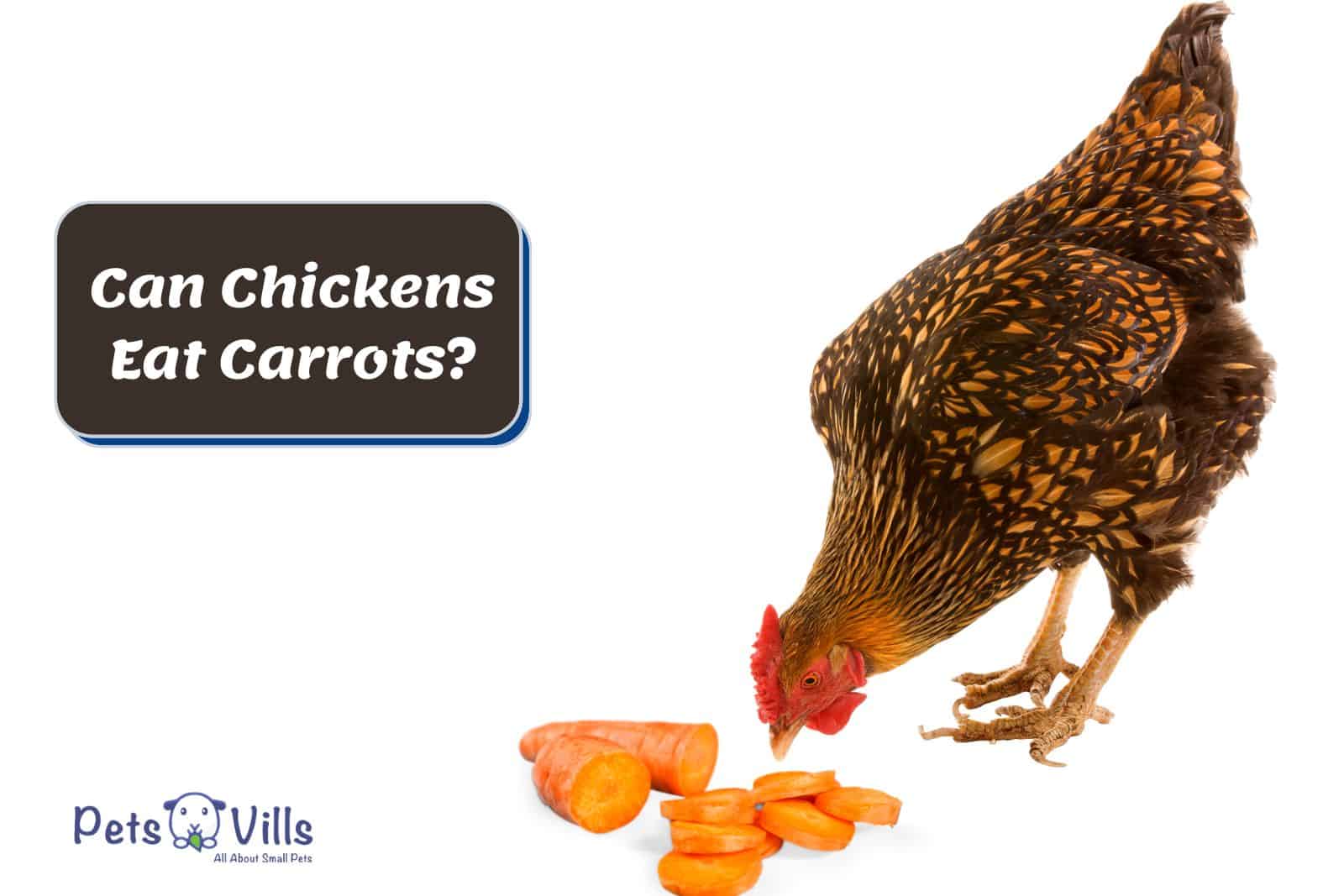Carrots are a popular vegetable to grow during the summer months. So it makes sense that many poultry owners wonder if they can give their flock carrots.
Can chickens eat carrots? Every expert agrees that chickens can eat carrots. It’s a recommended healthy treat with various beneficial nutrients (1).
However, there’s more to know before adding it to a chicken’s diet.
But if you keep reading, you learn everything to feed your chickens carrots safely.
Table of Contents
Key Takeaways
- Carrots are a wonderful way to provide chickens with a new treat. Your flock will love them and benefit significantly from their high nutritional value.
- Adding carrots to a chicken’s diet will improve digestion, offer a secondary water source, and boost its immune system.
- Carrots are only beneficial when used in limited amounts. Stick to providing them a few times weekly rather than daily.
Is It Healthy For Chickens To Eat Carrots?
Carrots are a root vegetable that’s a safe, healthy snack for chickens. It can provide a long list of benefits since it’s loaded with nutrients.
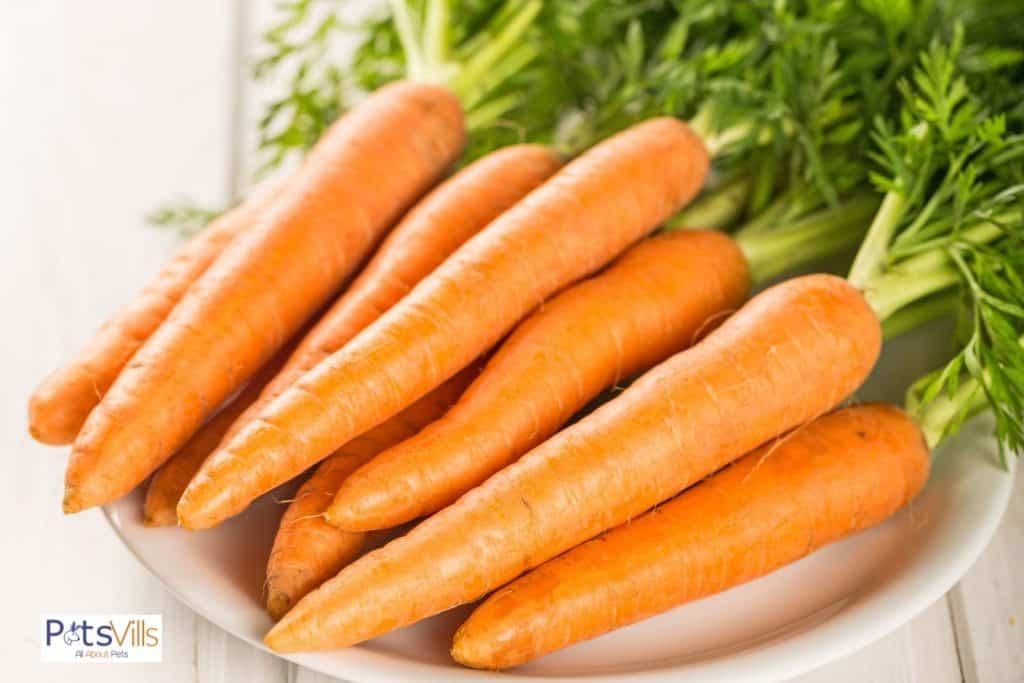
Let’s look at an overview of its nutritional content to give you a better idea. Here’s what you can expect from feeding your chickens 100 grams of chopped raw carrots (1):
- Calories: 41
- Water: 88%
- Protein: 0.9 grams
- Carbs: 9.6 grams
- Sugar: 4.7 grams
- Fiber: 2.8 grams
- Fat: 0.2 grams
Since you now know the nutrition facts, it’s time to discuss what benefits it can provide. So let’s not waste any more time and dive into our first health benefit:
#1 Improves Digestion
Backyard chicken keepers can benefit significantly from carrots having a high fiber content. It’s a valuable attribute due to its impressive impact on a chicken’s digestive system.
It boils down to pectin being the primary soluble fiber in carrots. These fibers help lower blood sugar levels by slowing down the digestion of sugar and starch.
Soluble fiber also feeds good gut bacteria, leading to improved digestive health. But this type isn’t the only helpful fiber found in carrots.
Your chickens will benefit from carrots containing insoluble fiber as well. Insoluble fibers help promote regular bowel movements and reduce the risk of constipation.
As a result, it’ll make food move through the digestive system smoothly. I can’t express how helpful a high fiber content veggie like carrots is for a chicken’s digestive system.
#2 Provides Hydration
One of the more remarkable aspects of carrots is their high water content. Honestly, most people are shocked to hear carrots are made up of 88% water.
It’s why I give my flock carrots during those hot, muggy summer months. This veggie becomes an excellent secondary water source to keep them hydrated.
They’ll also need these secondary water sources. Chickens get dehydrated quickly in the summer because most of their day is spent foraging in the sun.
In some cases, it can even lead to severe hydration and other health risks. So you must provide your flock with several ways to avoid these issues.
An excellent source of water, like carrots, can go a long way. Plus, they offer several other nutrition-related benefits to add an extra incentive.
#3 Boosts Immune System
It never hurts to provide your flock’s immune system with a little boost. Feeding them high-vitamin C foods like carrots is an excellent way.
If you do, these types of food can make your flock less prone to getting sick. It’s easy to imagine how helpful this boost could be during the winter when illness is common.
Furthermore, vitamin C will also help sick chickens recover fast (2). So carrots end up helping in two ways to help deal with illnesses around your chicken coop.
Can Chickens Eat Carrot Leaves?
There’s no reason why chickens can’t eat carrot leaves. Poultry owners shouldn’t hesitate to provide them to their chickens since they’re healthy and nutritious.

I’m also happy to report carrot leaves only require a little preparation. Chickens will be satisfied with either raw or cooked carrot leaves.
But If I had to choose one, I’d recommend using raw leaves. Cooking these leafy greens can make them lose some of their vital nutrients.
Therefore, feeding chickens raw carrot leaves ends up being more beneficial. You can even leave them attached to the carrots and feed them to chickens without prep.
How To Feed Carrots To Chickens
There are several methods to feed carrots to chickens. All the techniques are great, but you should choose the one that best fits you and your chickens.
I’ll help you make this choice by reviewing each method’s steps. From there, choosing one will become easy.
#1 Feeding Raw Carrots To Chickens
Your first method will be feeding raw, fresh carrots to chickens. The only problem with this option is baby chicks, and juvenile chickens may find them too tough to eat.
The next step to solve this issue would be cutting them into smaller pieces. Once you do, your backyard chickens will adore their new healthy treat.
If you prefer to avoid cutting them into smaller pieces, hanging raw carrots is an option. It’s simply putting them on a branch or similar structure.
It’ll keep them active and busy throughout the day. Moreover, extra exercise has always been a good idea for a flock.
#2 Feeding Cooked Carrots To Chickens
Cooking these veggies is another way to feed the chickens carrots. It’s an ideal way to remove any labor on your behalf by getting rid of any cutting prep.
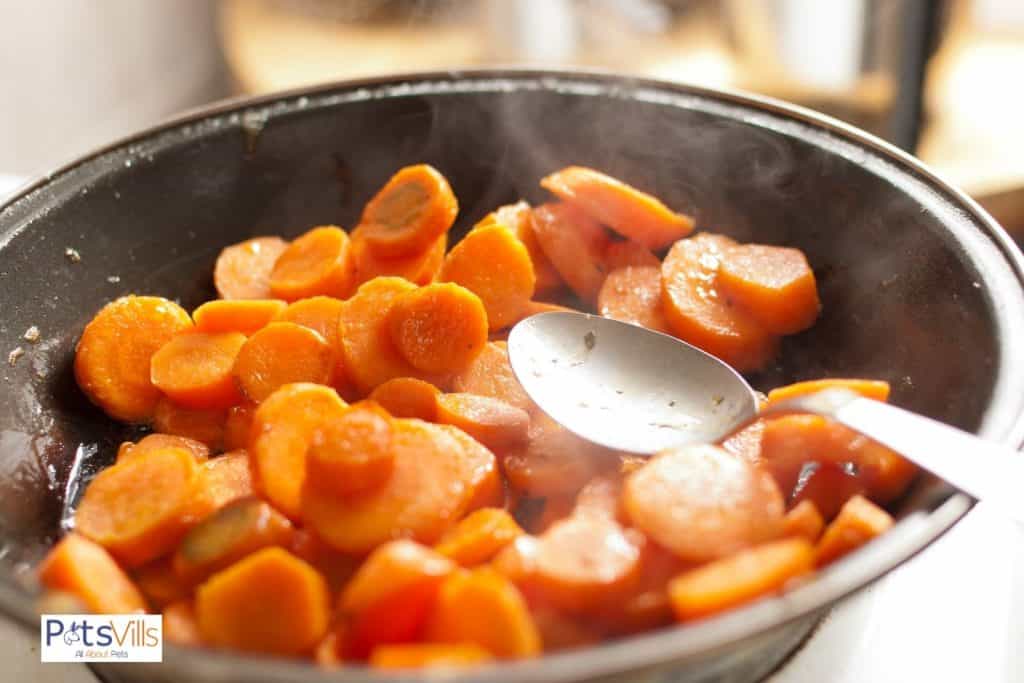
Instead, you cook the carrots to make them softer. This process will make them much smoother for a chicken’s digestive tract.
I also must mention that cooked carrots can be served whole or in pieces. It’s up to the person preparing them.
In my case, I leave them whole to eliminate any prep work on my part. But you might not be as lazy as me.
#3 Mixing Carrots with Chicken Feeds
Your last option is mixing these carrots with the daily chicken feeds. Most poultry owners go with this method because it’s a seamless way to provide extra nutrition.
As for the process, you can use both raw or cooked carrots. You only have to ensure they’re cut into smaller pieces before mixing them into the feeds.
Otherwise, the carrots could become choking hazards. The cutting process removes this slight risk entirely and doesn’t take much time.
How Many Carrots To Feed Chickens
Carrots have a well-earned reputation for being a healthy treat for chickens. But it doesn’t mean your feathered friends will benefit from a diet built around them.
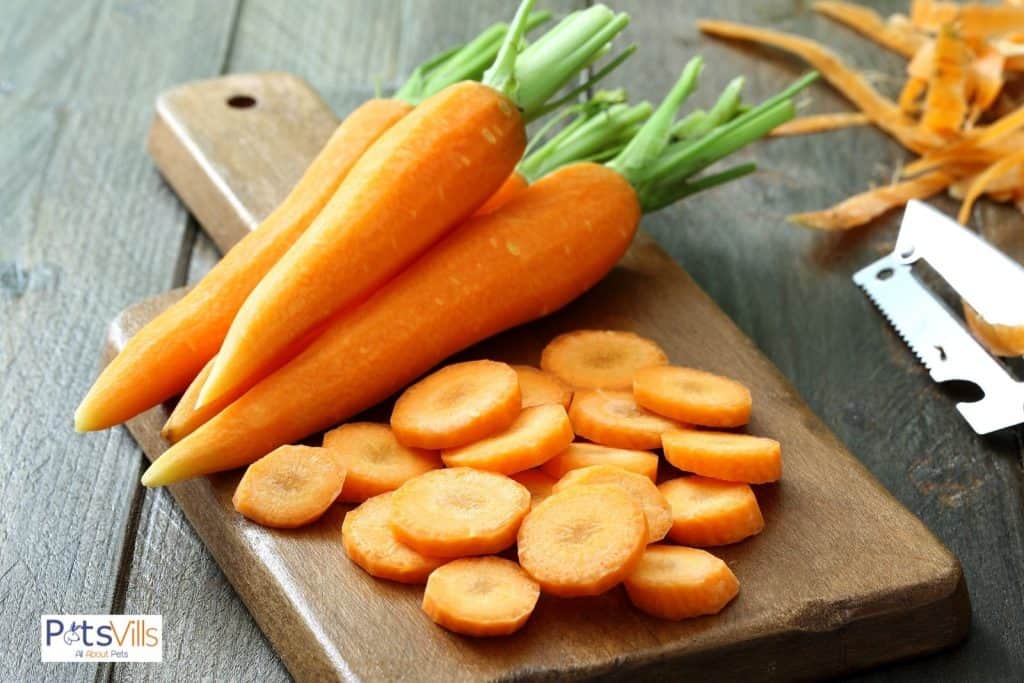
These veggies don’t provide enough nutrients for a chicken’s dietary needs. Due to this, experts suggest only giving carrots to chickens in moderation as a tasty treat.
If you feed them strictly carrots or too much, it could result in illness. Your chickens could also stop eating their feeds and only want their favorite treats.
None of these outcomes is something you want. So it’s best to allow carrots and other vegetables to make up 10% or less of your flock’s diet.
The central portion of their diet must come from quality commercial chicken feeds (3). Otherwise, they won’t get the essential nutrients to survive and live long lives.
All in all, think of carrots as an occasional treat to spice up the regular feed. A couple of times weekly should be more than enough carrots for your flock.
Other Vegetables That Chickens Can Eat
There’s a wide variety of vegetables for chicken consumption. It’s not only carrots, carrot tops, and carrot peels.
Below, I’ll discuss a few to help you spice up your flock’s diet even more. Let’s make sure your chickens get a little spoiled!
#1 Asparagus
Asparagus is an excellent treat for chickens due to its abundant nutrition. I don’t love it, but my chickens absolutely adore this veggie.
I also love how practical asparagus is compared to other veggies. For instance, chickens will enjoy them if they’re raw or cooked.
You can use every part of the asparagus except the red seeds pods. Please avoid these pods as they’re poisonous and cause digestive issues.
Everything else about this veggie is fair game for your chickens to eat.
#2 Broccoli
Another solid supplement treat for chickens is broccoli. It’ll offer a substantial amount of extra antioxidants and dietary fiber to help ensure your chickens remain in good shape.
Like with asparagus, broccoli is used raw or cooked. Both will offer all the benefits poultry owners could expect from this vegetable.
Honestly, broccoli is one of my favorite nutritious treats for chickens. It’s easy to prepare, and my chickens love it.
Feather your nest with knowledge by pecking at “Can Chickens Eat Raw Spaghetti Squash?”, “Can Chickens Eat Beets?”, and “Is Romaine Lettuce Good For Chickens?” – your next stop on the clucky road of chicken culinary delights!
FAQs
#1 Can chickens drink carrot juice?

Chickens can drink carrot juice. But if it’s store-bought, it’s not recommended due to added sugar and preservatives. All these add-ons are harmful to the chickens.
#2 Can chickens eat a carrot cake?
Chickens can eat carrot cakes, but it’s not recommended. This is because carrot cakes will have additional ingredients such as sugar, flavoring, and salt (4). All of these are bad for the chickens.
Conclusion
All in all, can chickens eat carrots became a simple question answer. Yes, they can, and you should provide carrots to chickens as a healthy secondary treat.
Carrots will then only improve your chicken’s life and health in various ways. There are a few better options to provide a spark into your chicken’s regular diet.
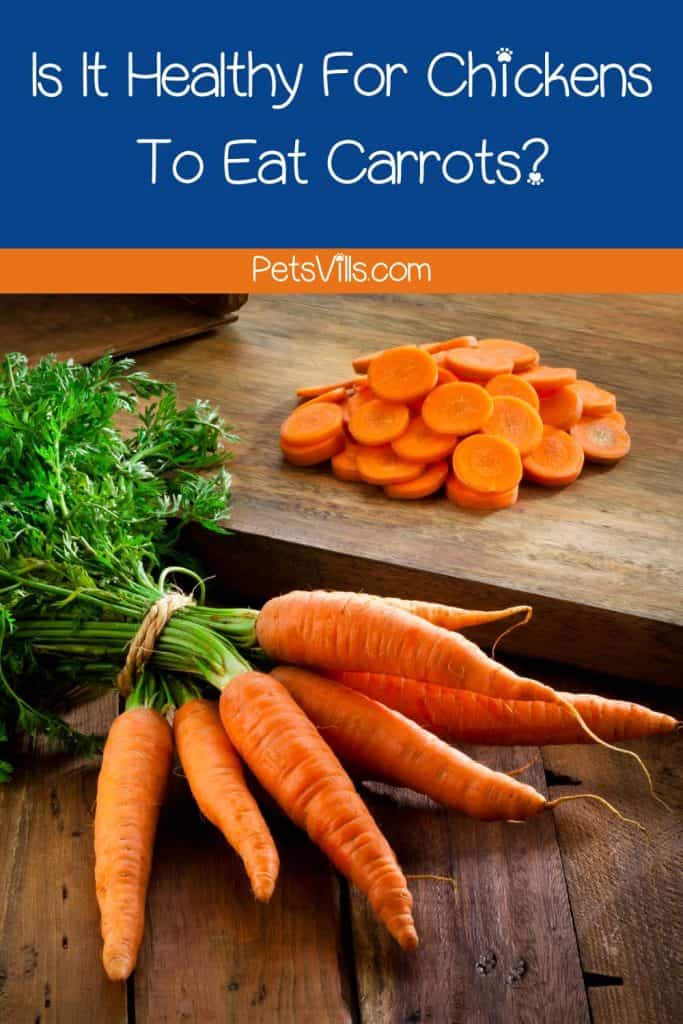
Resources
1. Carrots, raw [Includes USDA commodity food A099] Nutrition Facts & Calories [Internet]. nutritiondata.self.com. Available from: https://nutritiondata.self.com/facts/vegetables-and-vegetable-products/2383/2
2. Nutrition for the Backyard Flock [Internet]. extension.uga.edu. Available from: https://extension.uga.edu/publications/detail.html?number=C954&title=nutrition-for-the-backyard-flock
3. Jacob J, Pescatore T, Sciences F. E X T E N S I O N Agriculture and Natural Resources • Family and Consumer Sciences • 4-H Youth Development • Community and Economic Development How Much Will My Chickens Eat? [Internet]. Available from: http://www2.ca.uky.edu/agcomm/pubs/asc/asc191/asc191.pdf
4. Salt is an Important Nutrient for Poultry – Cooperative Extension: Livestock – University of Maine Cooperative Extension [Internet]. Cooperative Extension: Livestock. Available from: https://extension.umaine.edu/livestock/poultry/nutrition-for-chickens/

My name is Ben Roberts, and I absolutely love animals. So, naturally, I love writing about them too! As far as my animals, I have a Pit-bull, a Beagle-lab mix, a Chihuahua, and one old cat. Each one of them provides me with a new adventure every day. And the best part is they’re all best friends. Well, except the cat when he gets a little annoyed.
FIND HIM ON: FACEBOOK and TWITTER.
Read his latest ARTICLES
Learn more about Benhere

